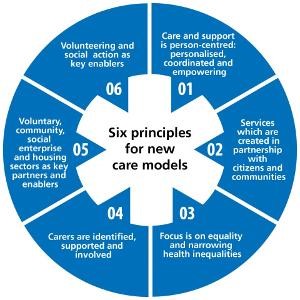You are here
- Home
- Blogs
- Daniel Haslam's blog
- Researching leadership in cross sector collaborations
Researching leadership in cross sector collaborations
New CVSL PhD student Daniel Haslam introduces his research into voluntary sector leadership in the context of cross-sector collaborations, which focuses on the emerging NHS multispecialty community providers.
MCPs are one type of a range of new initiatives within the NHS that make up the move towards ‘New Care Models’. These New Care Models are essentially different ways of working designed to attempt to address some of the challenges that the NHS is facing. The initial pilot areas of these New Care Models are known as ‘Vanguards’. Vanguards are a response to the NHS ‘Five Year Forward View’ and aim to implement the changes suggested within it, acting as ‘inspiration’ to the rest of the NHS.
The ‘Vanguards’ were originally announced in January 2015 and the first of the now 50 sites were selected after a bidding process in March of the same year. Initially there were three Vanguard types; alongside MCPs there were: ‘integrated primary and acute care systems’ and ‘enhanced health in care homes’ initiatives. Further developments introduced ‘Urgent and Emergency’ and ‘Acute Care Collaboration’ Vanguards. For further information, visit the NHS New Care Models website
So to summarise: New Care Models are new ways of working; MCPs are one type of new care model; Vanguards are pilot sites for these New Care Models. There are 14 MCPs in the NHS across England:


Understanding the new MCPs
MCPs in particular “will move specialist care out of hospitals into the community” . They have manifested themselves differently in the different areas but crucially all involve partnership working across organisations. Not all involve the Voluntary Sector but some have and continue to do so. Some even named voluntary sector services in their original applications.
Furthermore, the New Care Models ‘Six Principles’ include two that are specifically related to the involvement of the voluntary sector (5 and 6 below):

The money available for the entire Vanguard project is £200 million but no amounts have been guaranteed for specific areas or individual initiatives. The focus of the project is less on additional money and more on “providing practical support in order to help [Vanguards] realise their plans to improve services for local people”. There is also no given timeframe for the Vanguards and the expectation is that each area will be different.
As these projects are relatively new and in some instances still embryonic in their development, there has been very little academic attention paid to them; in particular to how the Voluntary Sector can work with them and how the elements of the ‘six principles’ can be practically enacted.
Notably, with the Voluntary Sector seen as key partners at the policy level it is important to decipher what exactly the role for Voluntary Sector Organisations (VSOs) can be and whether they can influence or control the agenda of these MCPs as they seek to provide more community approaches to care at a practical level; an arena that many VSOs have traditionally inhabited.
Within the context of a large reduction in voluntary sector funding over recent years, coupled with the fact that there is no guaranteed ‘new’ money for involvement in MCPs, how can VSOs justify their work in this area? Certainly, there has been involvement of the Voluntary Sector in MCPs since their introduction; how that is manifested is of crucial interest for formalising and progressing the relationship between the Voluntary Sector and New Care Models and fully enacting the ‘six principles’.
Researching the Vanguards
At a broad level, we have seen some Voluntary Sector involvement in supporting the New Care Models through work such as the King’s Fund leading a ‘Community of Practice’ around the ‘integrated primary and acute care’ Vanguards. However, very little attention has been paid to the work in local communities that is enabling the Vanguards – particularly the MCPs – to work (or not).
Within this context my research will explore the role of the Voluntary Sector in one particular MCP, focussing on the nature of the relationship between the NHS and the Voluntary Sector and whether the latter can be seen as leaders of these changing ways of working. Various questions sit below this broad aim, including:
- To what extent are Voluntary Sector organisations able to lead NHS MCPs?
- Is the involvement of Voluntary Sector organisations in MCPs a relationship of equals or leveraged exploitation?
- To what extent do the institutional antecedents of Voluntary Sector organisations (values, goals, capacity etc.) impact on the ability to lead cross-sector collaborations?
- How is informal leadership manifested in cross-sector partnerships?
I will be attempting to answer those questions by working very closely with VSOs – through engaged research – including by providing practical support in order to effect change. I start my work in October 2016.
4th October 2016
